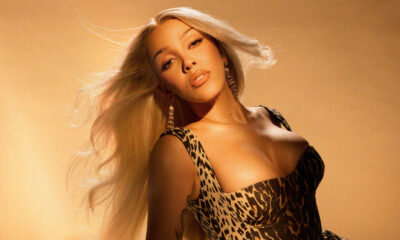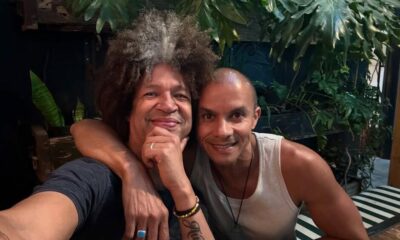Culture Craze
Doja Cat Opens Up About Her Absent South African Father and the Strength That Raised Her

In a rare, deeply personal podcast conversation, Doja Cat peeled back the layers of her world, not as a global pop star, but as a daughter. The Grammy-winning artist, born Amala Dlamini, spoke about growing up without her South African father, Dumisani Dlamini, and the complicated emotions that come with naming absence in public.
It wasn’t a publicity stunt or an orchestrated confession. It sounded more like someone finally exhaling after years of holding it in.
A Mother’s Love and a Heavy Load
Doja’s voice softened when she spoke about her mother, who raised five children on her own. She called her “incredible,” the kind of woman whose quiet determination set the rhythm for the whole family. Her mother’s strength became the blueprint for Doja’s resilience, the unspoken lesson behind every bold move and creative risk that would later define her career.
She didn’t grow up surrounded by privilege or constant reassurance. What she did have was a mother who made ordinary days feel stable, even when life wasn’t.
Naming the Absence
For years, fans have known fragments of Doja’s relationship with her father. This time, she spoke clearly: she said Dumisani Dlamini “abandoned” the family. Her tone wasn’t bitter; it was grounded, like someone who’s done the work to understand what that loss means.
She recalled a childhood that was both fun and tough, a mix of light and shadow. “It was paradoxical but real,” she said. There was no attempt to villainise, only to acknowledge. In her words, this was about “reckoning,” learning to live with what wasn’t given and creating love from what remained.
The South African Connection
For South Africans, the story hits closer to home. Dumisani Dlamini is a familiar name, known for his role in the iconic musical Sarafina! and for his long-standing career in local theatre and television. Years ago, he returned to South Africa, reportedly hoping his family might join him. That never happened.
While Doja’s fame has since exploded across global charts, her South African heritage remains a quiet, complicated thread in her story. Many fans in Mzansi have long expressed pride in her roots, even as the distance between her and her father remains unresolved.
View this post on Instagram
Public Reaction: Empathy and Reflection
Social media lit up after the podcast aired. Some fans applauded her honesty, calling it brave and overdue. Others hoped her openness might one day lead to healing between father and daughter. South Africans online reflected on the irony of global success springing from a story of disconnection, a reminder of how family, fame, and identity don’t always move in harmony.
Amid the speculation, there was a deeper conversation taking shape. Many saw their own experiences mirrored in hers: the ache of growing up without a parent, the search for belonging, and the understanding that resilience doesn’t always look like forgiveness.
Finding Light in the Gaps
Doja’s story isn’t just another celebrity headline. It’s a universal reminder that strength can grow in silence, that absence can shape identity as much as presence can. Her courage in naming the past gives space for others to do the same, to recognise that our beginnings don’t have to dictate our endings.
As she continues to perform on the world’s biggest stages, there’s something quietly powerful about the way she’s choosing to own her narrative. Through her music, her words, and her truth, Doja Cat is showing that even from fracture, beauty can emerge.
Also read: Cardi B opens up about depression, heartbreak, and finding strength again
Follow Joburg ETC on Facebook, Twitter, TikT
For more News in Johannesburg, visit joburgetc.com
Source: Bona Magazine
Featured Image: Bi.org



























